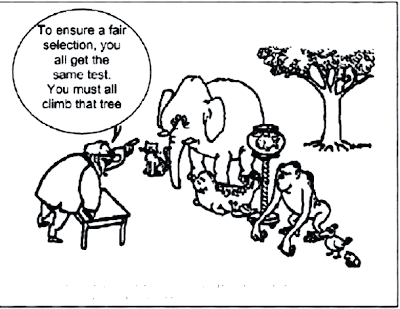 Legend:
Legend:
The cartoon shows a man behind a desk in a jungle clearing addressing a line up of various criature - cat, monkey, sea-lion, snake, frog and a goldfish in a bowl on a pedestal. "To ensure a fair selection you all get the same test" he says. "You must all climb that tree." (1) and (2)
"Para garantizar una selección justa, todos van a hacer la misma prueba – subir aquel árbol"
"Gender mainstreaming is the (re)organisation, improvement, development and evaluation of policy processes, so that a gender equality perspective is incorporated in all policies at all levels and at all stages, by the actors normally involved in policy-making. " COE EG-S-MS(1998)2rev
Gender mainstreaming does not replace specific policies which aim to redress situations resulting from gender inequality. Specific gender equality policies and gender mainstreaming are complementary and must go together to reach the goal of gender equality.
1 Why is it important to consider gender equality issues in mainstream policies?
"There is a dominant ethos in Western societies that opportunities should be equally open to all people, which is a fair and positive aspiration. However, it can be difficult for all people to access opportunities equally, as the cartoon shows.Clearly some of the animals will find it much easier than others to climb the tree! A recognition of this inequality forms the underlying principle of gender mainstreaming: the process of gender mainstreaming begins with acknowledging the fact that women and men are not able to access opportunities with the same ease. (1) (2) (3)
Mainstreaming includes gender-specific activities and affirmative action, whenever women or men are in a particularly disadvantageous position. Gender-specific interventions as positive discrimination can target women exclusively, men and women together, or only men, to enable them to participate in and benefit equally from development efforts. These are necessary temporary measures designed to combat the direct and indirect consequences of past discrimination.In order for men and women to be equally able to avail of all services and facilities, policy makers need to take account of the different situations and lifestyles of men and women, and plan for this. " (5)
Many governments and organisations have adopted gender mainstreaming as a strategy to promote equal opportunities between women and men in their Development Plan. Gender mainstreaming has therefore been adopted to promote equality between women and men in the following plans:
2 Examples:
2.1 - Access to services and facilities in Ireland (3)
This is the basis for mainstreaming equality. Underlying the concept of mainstreaming is recognition of the fact that not all groups or individuals in a society have the same ease in accessing opportunities. In order for all groups of people to be equally able to access the services and facilities, mainstream policies need to take account of the different ability of different groups to benefit, and plan for this. In this case we are concerned about the ability of women and men to access services and facilities provided by mainstream policies. A few statistics illustrate that women and men do not access services and facilities to the same extent or in the same way. To take a quick example, 63% of Irish men have a full driving licence, compared to 46% of Irish women . This difference is most significant in urban areas, and means women are more reliant on public transport than men, so are likely to access it more. In addition 73% of men are in the labour force compared to 50% of women. So women are more likely than men to be travelling to non-work facilities, such as shops, schools, health centres, and childcare facilities. Putting a gender equality perspective in mainstream transport policies thus means considering public transport provision not to just to work, but also to these other facilities to which women are more likely than men to travel, and taking these issues into account as policy is developed and implemented...
... More examples...
3 Main definitions:
(3a)European Commision
Gender mainstreaming is the systematic integration of the respective situations, priorities and needs of women and men in all policies and with a view to promoting equality between women and men and mobilising all general policies and measures specifically for the purpose of achieving equality by actively and openly taking into account, at the planning stage, their effects on the respective situations of women and men in implementation, monitoring and evaluation. (Commission Communication COM (96) 67 final of 21/02/96). 100 words for equality
(3b) United Nations "Mainstreaming a gender perspective is the process of assessing the implications for women and men of any planned action, including legislation, policies or programmes, in all areas and at all levels. It is a strategy for making women's as well as men's concerns and experiences an integral dimension of the design, implementation, monitoring and evaluation of policies and programmes in all political, economic and societal spheres so that women and men benefit equally and inequality is not perpetuated.The ultimate goal is to achieve gender equality."
(UN General Assembly A/52/3 18 September 1997)
(3c) Council of Europe (COE)..."Gender mainstreaming, as a new concept, appeared for the first time in international texts after the United Nations Third World Conference on Women (Nairobi, 1985), in relation to the debate within the UN Commission on the Status of Women (CSW) on the role of women in development."..."At the United Nations Fourth World Conference on Women (Beijing, 1995), the strategy of gender mainstreaming was explicitly endorsed by the Platform for Action which was adopted at the end of the Conference. The Platform for Action calls for the promotion of the policy of gender mainstreaming, repeatedly stating that "governments and other actors should promote an active and visible policy of mainstreaming a gender perspective in all policies and programmes, so that, before decisions are taken, an analysis is made of the effects on women and men, respectively"...
"Gender mainstreaming is the (re)organisation, improvement, development and evaluation of policy processes, so that a gender equality perspective is incorporated in all policies at all levels and at all stages, by the actors normally involved in policy-making. " COE EG-S-MS(1998)2rev
4 Sources:
(1) This cartoon was originally published in:(DGXXII (1995) Alpha Toolkit: Make changes for today which will be solutions for tomorrow, Brussels: DGXXII European Commission, p. 25
(2) Cartoon legend:Mainstreaming Equality in the European Union: Education, Training and Labour Market Policies (PDF Google) By Teresa L. ReesPublished by Routledge, 1998ISBN 0415115337, 9780415115339 260 pages, p. 26
(3) Text adapted from NDP Gender Equality Unit Department of Justice, Equality and Law Reform , Ireland
(5) ILO 2002
http://www.ilo.org/public/english/bureau/gender/newsite2002/about/defin.htm
(6) Council of Europe and gender mainstraming
http://www.coe.int/t/e/human_rights/equality/02._Gender_mainstreaming/
(7) International Telecommunications Union and gender mainstreaming
http://www.itu.int/ITU-D/gender/gender_mainstreaming_activities.html
(8) Unesco Gender Maintraming
http://portal.unesco.org/en/ev.php-URL_ID=10996&URL_DO=DO_TOPIC&URL_SECTION=201.html



